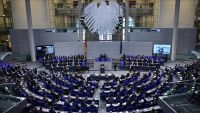Whether it is the attacks on migrants crossing the Mediterranean or questions about Nick Clegg's heritage, our national debate on immigration has taken a nasty turn.
The immigration debate has been spiraling into a toxic swamp propelled by cross-party consensus to "control immigration". While a coherent argument on immigration is decades overdue, the current anti-immigrant debate has slipped into a new realm, targeting second generation immigrants. The Daily Express has already attempted to classify the British born BME community as "hidden migrants". With this context, Evan Davis's interview with Nick Clegg was difficult to watch.
Nick Clegg proudly spoke of his European heritage, his Dutch mother, and his grasp of five languages. In an attempt to point out Clegg's elitist upbringing, Davis questioned if Clegg's multicultural upbringing has put him out of touch with the British working class. Davis had a number of examples of elitism to choose: his gap year, his time at Oxbridge, or his public school education. The choice to fixate upon Clegg's multicultural upbringing, suggesting it to be out of touch with "British" people, made for uncomfortable viewing. For centuries immigrants have been an integral part of the British working class. Within the context of the current immigration climate, it feels like further demonisation of BME people.
Davis's intention was unlikely to be intentional racial discomfort, but Clegg's furious reaction mirrored that of many children of migrants. Our Britishness is consistently questioned despite having lived in the UK for our entire lives. Casual racism is on the rise, particularly within politics. On the doorstep a BME canvasser is increasingly likely to hear "I don't want your people here", and worse. These experiences lead to racial sensitivity and passing comments questioning multiculturalism vs Britishness can be interpreted as a personal attack when coupled with modern attitudes to race in Britain.
For the British Asian community, the Ugandan exile was only one generation ago. The discussions of identity, culture, and language are still quite raw for many British migrant communities. Fueled by the rising anti immigrant sentiment, communities are continuously feeling unwanted. This is leading to a rise in extremism, as well as record levels of BME voter apathy. A BBC news personality should understand the effects of language within such a climate and should be able to recognise why using such an argument is harmful towards people already at risk of social exclusion.
Davis's unwillingness to comprehend the harm to BME communities demonstrates a lack of compassion, as well as a lack of cultural awareness at the BBC. His intentions may not have been malicious, but seeing such comparisons on prime time BBC One make the children of migrants feel like they must justify their heritage and language to all of the people they meet on a regular basis who question their identity. Davis does not have to regularly prove his 'Britishness' and therefore he is unable to comprehend his statement for people who have to regularly prove their British identity.
The immigration debate has taken a drastic turn if journalists are so desensitised to such cultural comparisons possibly causing harm. Britain has thrived on multiculturalism, yet if the "British working class" see multiculturalism as an elitist concept, we have serious problems with integration. Politicians need to prioritise multicultural integration within these communities if Davis's statement is true. The curriculum must be reformed to ensure young people are taking up languages. Our cultural divisions are being exploited by politicians and communities are falling behind. Integration can only go hand in hand with an acceptance of multiculturalism and diverse communities. For immigrants and their children, political discourse is attempting to create divisions within society. We constantly feel like we must prove our value and it is not helped by journalists inadvertently contributing to these divisions. We need to seriously look into why multiculturalism is regarded as an elitist concept, despite the "British working class" being extremely multicultural. Most of all, we need to acknowledge when the immigration debate creates sensitivity and unease within BME communities.
Source: Newstatesman









